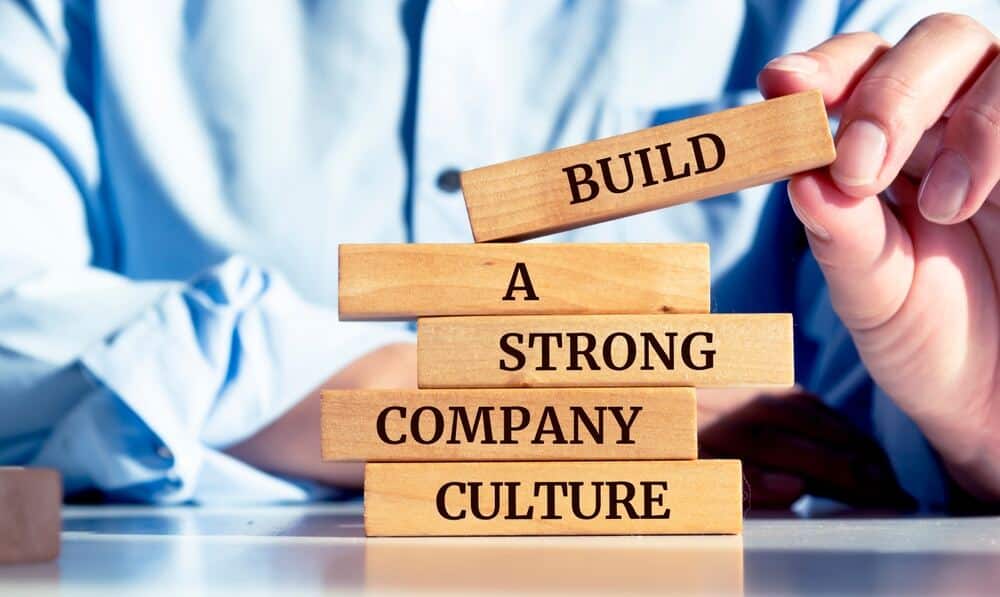The DNA of a Workplace: What is Company Culture and Why Does It Matter

May 13, 2024
When you sit down to work every day, what’s the vibe you get? Are people zoned in on their work immediately, or engaged in lively conversations? Does the space feel inviting or utilitarian? Do your coworkers seem energized to be there or counting down the minutes until 5pm?
The answers to these questions provide a glimpse into something intangible yet incredibly powerful and that’s defining company culture.
What is Company Culture?
Company culture is the shared values, beliefs, behaviors and practices that shape how an organization operates. It’s the personality of the business – the way things are done and the unspoken rules everyone follows. Culture guides interactions between colleagues, priorities and decision making, and the overall work environment.
Now… keep in mind. There’s no right or wrong way to do company culture. Some businesses need to operate more competitively and results-driven; that’s fine. But it’s all about balance.
When you think of “what is a good company culture” and your mind wanders to free coffee and pizza on Friday, you need to reevaluate what your employees actually want.
What is the Importance of Company Culture?
Far from being a “fluffy” concept, company culture has real bottom-line implications. Here are some of the key reasons culture matters:
High Employee Engagement
When employees feel connected to their organization’s mission and values, they’re more likely to be engaged and go the extra mile. Strong cultures foster a sense of belonging and purpose that motivates people to do their best work. Teams are more collaborative and willing to tackle challenges together.
Improved Employee Retention
People want to work somewhere that aligns with their own beliefs and makes them feel good about coming to work each day. A positive culture is a powerful retention tool. Employees in thriving cultures are less likely to leave for a competitor. This saves time and money that would otherwise be spent on recruiting and training new hires.
Increased Productivity
Engaged, committed employees tend to be more productive. When folks are excited to come to work and feel a sense of psychological safety, they can focus on doing great work rather than politics or job-searching. Strong cultures orient everyone around clear goals and empower them to make decisions to reach those goals.
Stronger Recruiting
Companies known for their great cultures have a leg up in the war for talent. Job seekers are drawn to organizations with a reputation for taking care of employees and providing opportunities for growth. A compelling culture can help you attract high performers who will further strengthen the business.

The Risks of Poor Company Culture
What is the culture of a company without risks? Choosing a dysfunctional culture has some serious ones.
High Turnover
If people are constantly jumping ship, that’s a red flag that something is amiss with the culture. Perhaps expectations are unclear, employees feel undervalued, or toxic behaviors are tolerated. High turnover is costly and makes it difficult to build institutional knowledge and continuity.
Low Morale
If a company doesn’t have good culture, your people might show up because they need the paycheck but they won’t give you much else. There’s more gossiping than collaborating. People feel stagnant in their roles and unsupported by leaders. This creates a vicious cycle that further erodes morale and performance.
Bad Reputation
Culture issues have a way of leaking outside company walls. With sites like Glassdoor, it’s easy for job seekers to get an unfiltered view into the employee experience. Negative reviews and word of mouth can scare away top talent and even customers. It can take years to recover from a tarnished employer brand.
Low Productivity and Engagement
Poor culture creates a drag on the business. Unclear direction, inefficient processes, and interpersonal conflicts distract from the work itself. Without an overarching sense of purpose, it’s easy for employees to become disengaged and simply go through the motions. Innovation and creativity suffer.
How Do You Establish Strong Culture in a Company?
Building a great culture isn’t a matter of simply copying the latest trends in the industry. It has to be thoughtful and authentic to your organization. Some steps to get started:
- Define your core values and live them every day. This is the foundation of your culture.
- Communicate the culture clearly and consistently, starting with onboarding. Make sure everyone is aligned.
- Get employee feedback regularly and act on it. The best cultures evolve based on input from the people who live it.
- Recognize and reward people who exemplify the culture. What gets recognized gets repeated.
- Hold everyone accountable to the cultural standards, especially leaders. No one can be above them.
What is Culture in a Company Done Right?
You know how to establish company culture but how do you live it every single day? You need to show your employees appreciation for their work. Don’t just expect them to show up because they have to – make it known that they are appreciated and you are happy to collaborate with them every day.
Most importantly, stick to it and be consistent. You need to practice what you preach, follow your own rules, and do so every single day even when you’re not feeling quite up to it.
You can reward employees with tickets to sporting events, meal vouchers, and premium incentives.
Final Thoughts
Company culture isn’t about gimmicks or having the coolest office. It’s the set of shared behaviors and values that shape how work gets done. It has an outsized impact on your ability to attract, engage and retain great employees.
Building a strong, purposeful culture takes effort and intentionality. But for companies that get it right, culture becomes a powerful competitive advantage – the DNA that sets them apart.
[vc_row padding_top=”5″ padding_bottom=”10″][vc_column][vc_column_text css=”.vc_custom_1698933397671{padding-top: 100px !important;}”]How would you like to login?[/vc_column_text][/vc_column][/vc_row][vc_row][vc_column][vc_column_text]Select the type of account you wish to access. Please choose the appropriate portal to ensure you have the right permissions and access.[/vc_column_text][/vc_column][/vc_row][vc_row css=”.vc_custom_1698930306749{margin-top: 5px !important;}”][vc_column][vc_column_text css=”.vc_custom_1698932956649{padding-top: 10px !important;}”][/vc_column_text][/vc_column][/vc_row][vc_row padding_top=”20″ padding_bottom=”12″ css=”.vc_custom_1698934099186{margin-top: 10px !important;margin-bottom: 15px !important;}”][vc_column width=”3/4″][vc_row_inner][vc_column_inner width=”1/6″][vc_icon type=”typicons” icon_typicons=”typcn typcn-lock-closed” color=”custom” css=”.vc_custom_1698932355827{margin-top: 0px !important;margin-right: 0px !important;margin-bottom: 0px !important;margin-left: 0px !important;border-top-width: 0px !important;border-right-width: 0px !important;border-bottom-width: 0px !important;border-left-width: 0px !important;padding-top: 0px !important;padding-right: 0px !important;padding-bottom: 0px !important;padding-left: 0px !important;}” custom_color=”#9195a1″ el_class=”pop-up-icons”][/vc_column_inner][vc_column_inner width=”5/6″][vc_column_text]Employer Portal: Access backend and employer functionalities.[/vc_column_text][/vc_column_inner][/vc_row_inner][/vc_column][vc_column width=”1/4″]SIGN IN[/vc_column][/vc_row][vc_row][vc_column width=”3/4″][vc_row_inner][vc_column_inner width=”1/6″][vc_icon type=”entypo” icon_entypo=”entypo-icon entypo-icon-globe” color=”custom” size=”sm” css=”.vc_custom_1698932379355{margin-top: 0px !important;margin-right: 0px !important;margin-bottom: 0px !important;margin-left: 0px !important;border-top-width: 0px !important;border-right-width: 0px !important;border-bottom-width: 0px !important;border-left-width: 0px !important;padding-top: 0px !important;padding-right: 0px !important;padding-bottom: 0px !important;padding-left: 0px !important;background-position: 0 0 !important;background-repeat: no-repeat !important;border-left-style: none !important;border-right-style: none !important;border-top-style: none !important;border-bottom-style: none !important;}” custom_color=”#9195a1″ el_class=”pop-up-icons”][/vc_column_inner][vc_column_inner width=”5/6″][vc_column_text]Employee Portal: Use the app and access employee services.[/vc_column_text][/vc_column_inner][/vc_row_inner][/vc_column][vc_column width=”1/4″][vc_row_inner text_align=”center”][vc_column_inner]SIGN IN[/vc_column_inner][/vc_row_inner][/vc_column][/vc_row]
